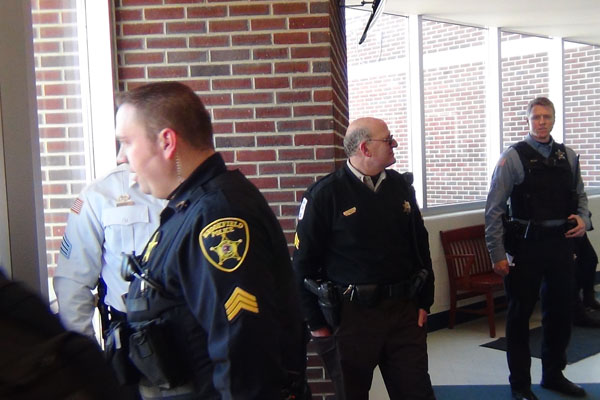Administration ponders new ways to address school security
Dughetti hired as additional full-time dean

A threatening phone call in February has motivated administration in continuing to revamp school security measures.
May 15, 2014
RB considering using live blanks during lockdown drills
Following the soft lockdown alert in February, Assistant Principal John Passarella proposed firing blank shells during a future lockdown to further simulate a more life-like scenario.
“It seems like we may have plateaued with the intruder drills. We need to try more ideas,” Passarella said. “It is important to expose the students and staff to what they would experience in case of an event happening.”
The idea of using blanks is not unique to RB.
“At conferences I have been to, they proposed this idea of acclimating the students to these scenarios,” he said.
Junior Matt Chapp saw the value in Passarella’s idea, but understood its limitations.
“There is no certain, actual way to prepare for an actual lockdown with an intruder,” Chapp said. “However, this would bring a greater sense of urgency and realism to the drill.”
US History teacher John Fields had other concerns.
“On the one hand, I understand the lockdown situation should be as real as possible. On the other hand, my only concern is that students would see this as another opportunity to mess around and laugh at something else. It would not be as impactful,” he said.
The idea of using blanks in a lockdown drill may be too realistic for some.
Freshman Olivia Weimer said, “It would certainly prepare students better for the drill, but it would be pretty scary. If they didn’t warn us in advance, some kids may actually call the police, I think.”
As students consider how to react in a lockdown – should they try to overpower an intruder or arm themselves with scissors and yard sticks and other classroom supplies – Passarella has told students that it is a good idea to call the police in a real lockdown situation. According to Passarella, in the event of a real lockdown, the police station should have 1500 calls coming from RB, the approximate enrollment of the school.
“There is no one way to address a [lockdown] situation,” Passarella said. “It ultimately depends on the first responders in the situation, who are indeed the students and staff.”
Intruders with guns are not the only threat that can cause a lockdown. RB has received bomb threats in the past, both during the school day and after. The lockdown procedure there is essentially the same as in the case of gun violence. In February, RB experienced a “soft” lockdown, where class could continue but students were not able to leave the classroom until the lockdown ended. In case of a bomb threat, students could be in a soft lockdown while bomb sniffing dogs would be brought to conduct a search of the building.
Passarella knows that he has to rely on the students and staff to help keep the building secure.
“I have roughly 1500 security guards here. The students know when something is off and will say something about it. No school is completely safe, but I feel safe in this school,” he said.
New Dean Neil Dughetti increases role in school security
As RB continues to work to improve the security of the school, former Science teacher Neil Dughetti was recently approved by the school board to become a full-time dean for 2014-15.
“The best way to prepare for something is to experience it,” Dughetti said regarding using blanks during lockdown drills. “However, the staff, students, and community should be notified before a drill like this.”
Dughetti also worked at Ridgewood, where he was with the students as he watched this technique being performed. It was very effective.
Dughetti has been a teacher at RB for eleven years and a part-time administrator for four years. Having worked inside the building already, he has seen what RB’s students are like and has worked with the community, something an outside administrator would not have had experience doing.
An experience as a classroom teacher helped Dughetti clarify what he wanted to be doing for RB.
“Six years ago, in one of my classes, a student was drawing inappropriate pictures. I knew he would be suspended, but I had to write him up. Flash forward to senior year, graduation night. The student thanked me because he said being suspended straightened him out and made him realize he was making poor choices.”
The event made Dughetti consider changing his focus from classroom teaching to administration.
“That was when I realized I wanted to play a bigger role and help out students more,” he said.



